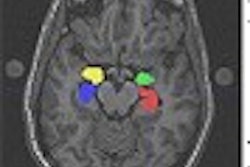Canadian medical device company VSM MedTech of Vancouver, British Columbia, has begun development of a hybrid magnetoencephalography (MEG)/MRI system capable of combined anatomical and functional imaging of the brain and in utero fetus.
The new system will combine VSM’s MEG technology with ultra-low field MRI technology from the University of California’s Lawrence Berkeley National Laboratory.
The low-field MRI technology makes use of superconducting quantum interference devices (SQUIDs), used in the detection of extremely small magnetic fields. Using SQUIDs, Berkeley Lab researchers have demonstrated that MRI images are obtainable in very low magnetic fields, eliminating the need for the large magnets typically used in MRI systems.
Considerations of cost, bulk of the magnets, potential hazards of high fields, and image resolution make it desirable to use lower magnetic fields but this has, to date, not been practical, said VSM. Berkeley Lab’s SQUID-based MRI technology can also perform MR spectroscopic imaging, whereby images of certain metabolites within the brain and in utero fetus would also be obtainable, said the company.
The Berkeley Lab selected CTF Systems, a VSM subsidiary, to receive an exclusive license to the low-field MRI technology for use with its MEG technology, subject to finalization of a definitive agreement. Under the terms of the proposed licensing agreement, CTF will pay Berkeley Lab a royalty based on sales of the hybrid MEG/MRI systems.
By AuntMinnie.com staff writersSeptember 25, 2003
Related Reading
CTF sells first mobile MEG unit, September 1, 2003
Price joins VSM Medtech board, August 21, 2003
VSM Medtech notches third profitable quarter, August 1, 2003
CTF places three MEG units, June 26, 2003
VSM expands U.S. presence, June 19, 2003
Copyright © 2003 AuntMinnie.com



















